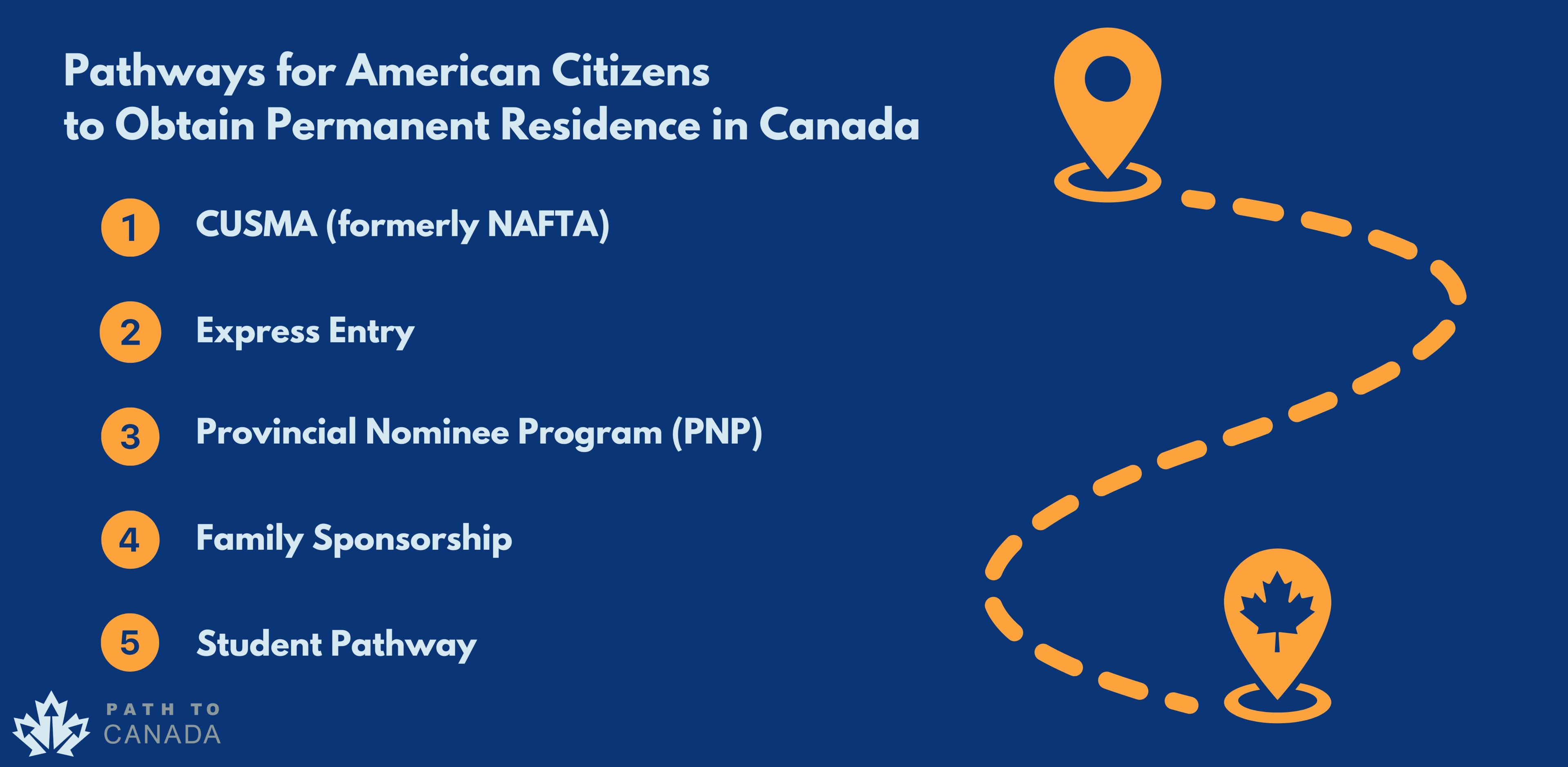The idea of moving to Canada is not new for Americans, but recent years have seen a notable surge in interest. This blog explores why so many Americans are considering leaving the U.S. for Canada, popular relocation options, and practical pathways to help American citizens make the move, including how the Canadian government establishes criteria and supports various immigration processes and programs.

How Many Americans Are Considering Leaving?
Data shows that interest in moving to Canada has spiked multiple times since 2016, particularly around U.S. political events. When Donald Trump won the presidency in 2016, Canada’s immigration website crashed from the increased web traffic, as “move to Canada” became a trending search. Likewise, significant numbers have researched relocation to Canada following both Trump’s and Joe Biden’s administrations due to dissatisfaction with U.S. policies and quality of life concerns.
Polling data indicates that 8% of potential immigrants worldwide would prefer to move to Canada, while the United States holds only 18% of global interest, with numbers waning over the years. Americans’ reasons for considering relocation are varied and include political polarization, the cost of healthcare, safety concerns, and more personal or economic considerations.
To enter Canada, U.S. citizens must understand the requirements and processes for visitors, work permit applicants, or through specific immigration programs, highlighting the importance of securing a visa or permit to lawfully reside or work in Canada.
How Many Americans Actually Relocated?
From 2016 to 2020, the number of Americans obtaining Canadian permanent residence increased. During Trump’s presidency, over 37,000 Americans made the move—around 770 per month. Following Biden’s election, American immigration to Canada has grown even more, averaging over 1,000 people monthly. Many Americans were influenced by Canada’s progressive immigration policies, affordable education, and quality healthcare, factors that help ease the decision to relocate.
What are the top 3 countries Americans have relocated to?
In recent years, three of the top destinations for Americans seeking to permanently relocate due to U.S. political scenarios are Canada, Portugal, and New Zealand. Each offers unique advantages, friendly policies for foreigners, and high quality of life, making them attractive to Americans seeking a new home. Canada, for instance, has federal economic immigration programs designed for individuals seeking permanent residence, focusing on attracting skilled workers through strict eligibility criteria and selection processes. Here’s what makes each country stand out:
1. Canada
Proximity and Cultural Similarities:
Canada’s proximity to the U.S. allows for easy travel between the two countries, and its cultural and linguistic similarities make it easier for Americans to adapt. Canada shares many values with the U.S., such as a commitment to democracy, human rights, and diversity.
Progressive Social Policies:
Canada’s universal healthcare system, emphasis on social welfare, and affordable higher education are major draws. The country also has a strong commitment to environmental protection and a more progressive political climate, which appeals to Americans seeking stability.
Pathways for Skilled Workers:
Programs like Express Entry and the Provincial Nominee Program (PNP) allow skilled workers to obtain residency, and the Global Talent Stream fast-tracks work permits for high-demand roles, especially in tech. These programs make it relatively easy for highly skilled Americans to secure a work permit and work and live in Canada.
2. Portugal
Quality of Life and Affordable Cost of Living:
Portugal is known for its mild climate, stunning coastlines, and affordable living costs, especially compared to the U.S. The country offers high-quality public healthcare and education, appealing to families and retirees looking for a slower pace of life.
Golden Visa and D7 Visa:
Portugal’s Golden Visa allows individuals to gain residency through property investment, making it a popular choice for those with the means to invest. For retirees or remote workers, the D7 Visa is an option that doesn’t require employment within Portugal. This residency-friendly policy makes Portugal a top choice for Americans seeking a slower lifestyle and an appealing investment climate.
Safety and Expat-Friendly Culture:
Portugal ranks as one of the safest countries globally and has a vibrant expat community, making it relatively easy for Americans to connect and settle in. English is widely spoken in urban areas, which helps Americans transition smoothly.
3. New Zealand
Scenic Environment and Outdoor Lifestyle:
New Zealand’s natural beauty, from mountains to beaches, along with a slower-paced lifestyle, attracts Americans who value outdoor activities and work-life balance. It’s known for its environmental focus, which aligns with the values of many seeking an eco-conscious lifestyle.
Stable Political Climate and Progressive Policies:
New Zealand has a stable political environment and is known for progressive stances on social issues, including strong labor protections, gender equality, and environmental policies. This stable and inclusive environment is appealing to those seeking political stability.
Pathways for Skilled Workers and Remote Workers:
New Zealand has immigration pathways for skilled workers, particularly in sectors where it has labor shortages. The country also has the Silver Fern Job Search Visa, designed for young professionals, and promotes remote work visas for individuals with sufficient income or skills in demand.
These three countries provide different pathways to residency, favorable living conditions, and supportive policies that appeal to Americans. Additionally, each offers an attractive mix of social stability, quality healthcare, and support for skilled workers or retirees, making them ideal destinations for a variety of lifestyle preferences.
Why is Canada the top choice for Canadian Citizenship?
Canada is a top choice for Americans due to its universal healthcare, high quality of life, and welcoming stance on immigration. Moreover, Canada’s strong job market and need for skilled workers align well with the skills of highly educated American immigrants. The country’s progressive policies, particularly regarding work-life balance, parental leave, and support for immigrants, are appealing aspects.
Before one can apply for Canadian citizenship, it is important to have permanent resident status and meet the physical presence requirements in Canada.
In addition, Canada is experiencing a labor shortage, leading the country to set ambitious immigration targets to address this gap. Canada has made its immigration process more accessible and efficient, especially for skilled workers, through pathways like the Express Entry system and the Provincial Nominee Program (PNP). The Global Talent Stream, introduced in 2017, helps fast-track work permits for tech and highly skilled workers, drawing U.S.-based talent to Canadian tech hubs like Toronto and Vancouver.
How to Move to Canada: Pathways for American Citizens to Obtain Permanent Residence
There are several popular pathways for Americans seeking Canadian residency:

CUSMA (formerly NAFTA)
The Canada-United States-Mexico Agreement facilitates easier cross-border movement for professionals, traders, and investors. Under the CUSMA Professional category, Americans in specific occupations can obtain work permits without needing a Labour Market Impact Assessment (LMIA), making it a straightforward option for skilled U.S. workers.
Express Entry
This is the most common route for skilled workers. Based on a points system, applicants are scored on factors like education, work experience, and language skills. Once in the Express Entry pool, applicants may receive an Invitation to Apply (ITA) for permanent residency, which can help them obtain Canadian permanent residence.
Provincial Nominee Program (PNP)
Each province in Canada has specific needs and may nominate individuals based on skills that match local labor shortages. PNPs allow for a faster pathway to permanent residency, especially for those with specialized skills. Being nominated through a PNP can significantly increase the chances of becoming a permanent resident.
Family Sponsorship
Americans with close family members who are Canadian citizens or permanent residents may be eligible for sponsorship. This includes sponsoring a spouse or common-law partner, which requires proving the relationship and meeting specific eligibility requirements.
Student Pathway
Many Americans also choose to study in Canada, as the cost of higher education is often more affordable than in the U.S. Studying in Canada can also lead to post-graduation work permits and eventually permanent residency.
Healthcare and Taxation in Canada
Moving to Canada from the US can be a significant change, and understanding the healthcare and taxation systems in Canada is essential. Canada’s healthcare system is publicly funded, and all Canadian citizens and permanent residents have access to their home province’s health insurance program, which covers necessary hospital and physician services. This is a stark contrast to the US, where healthcare is primarily private and often comes with high costs.
As a US citizen moving to Canada, you may be eligible for Canada’s healthcare system, but you might also need to consider private health insurance options, especially during the initial period of your move. It’s crucial to research and understand the healthcare options available to you in Canada to ensure you and your family are adequately covered.
Regarding taxation, Canada and the US have a tax treaty in place to prevent double taxation, which is a significant relief for many expatriates. As a US citizen living in Canada, you will be required to file taxes in both countries. However, the tax rates and laws in Canada differ from those in the US. For instance, Canada has a higher tax rate on income but provides more social services, such as universal healthcare and education, which many find to be a fair trade-off.
Understanding the tax implications of moving to Canada is crucial. Consulting with a tax professional who is familiar with both US and Canadian tax laws can help ensure you meet your tax obligations in both countries and take advantage of any available tax credits or deductions.
Accommodation and Settlement in Canada
Finding a place to live in Canada can be a challenging task, especially in larger cities like Toronto and Vancouver. As a US citizen moving to Canada, you may want to consider renting an apartment or house before buying a property. This approach allows you to get familiar with the area and understand the local real estate market before making a long-term commitment.
Canada offers a variety of accommodation options, ranging from apartments and houses to condos and townhouses. You can search for properties online, through real estate agents, or by driving around neighborhoods and looking for “For Rent” signs. Websites like Realtor.ca and Kijiji are popular resources for finding rental properties.
Once you’ve found a place to live, you’ll need to sign a lease and provide proof of employment and income. You may also need to provide a security deposit, which is usually equal to one month’s rent. It’s important to read the lease agreement carefully and understand your rights and responsibilities as a tenant.
In addition to finding a place to live, settling in Canada also involves getting familiar with the local culture, customs, and way of life. Joining local clubs or organizations, volunteering, or taking language classes to improve your French or English skills can help you integrate into the community. Canada is known for its welcoming nature, and many cities have programs in place to help newcomers settle in. For example, the City of Toronto has Newcomer Services Kiosks that provides information and resources for new immigrants.
Overall, moving to Canada from the US requires careful planning and research. By understanding the healthcare and taxation systems, finding a place to live, and getting familiar with the local culture, you can make a smooth transition to your new life in Canada.
Your Partner in Navigating the Express Entry System and Moving to Canada with Ease
Moving to Canada is a life-changing decision, but it doesn’t have to be overwhelming. Whether you’re considering relocating for better work opportunities, a higher quality of life, or a fresh start, understanding the pathways and preparing properly is key.
At Path to Canada, we specialize in helping individuals navigate the complexities of Canadian immigration. Our team can assist with understanding programs like Express Entry, CUSMA, and family sponsorship, as well as addressing concerns about healthcare, taxation, and settling into your new home.
If you’re ready to explore your options or need personalized guidance, don’t hesitate to reach out to Path to Canada. Let us help you take the next steps toward making Canada your new home.
The content and materials available via Path to Canada are for informational purposes only and do not constitute legal advice.
